
A supergroup is a musical group formed with members who are already successful as solo artists or as members of other successful groups. The term became popular in the late 1960s when members of already successful rock groups recorded albums together, after which they normally disbanded. Charity supergroups, in which prominent musicians perform or record together in support of a particular cause, have been common since the 1980s. The term is most common in the context of rock and pop music, but it has occasionally been applied to other musical genres. For example, opera superstars the Three Tenors and hip hop duos Kids See Ghosts and Bad Meets Evil all have been called supergroups.

The Animals are an English rock band, formed in Newcastle upon Tyne in the early 1960s. The Animals are known for their deep-voiced frontman Eric Burdon and for their gritty, bluesy sound, exemplified by their signature song and transatlantic number-one hit single "The House of the Rising Sun" as well as by hits such as "We Gotta Get Out of This Place", "It's My Life", "Don't Bring Me Down", "I'm Crying", "See See Rider" and "Don't Let Me Be Misunderstood". They balanced tough, rock-edged pop singles against rhythm-and-blues-oriented album material and were part of the British Invasion of the US.
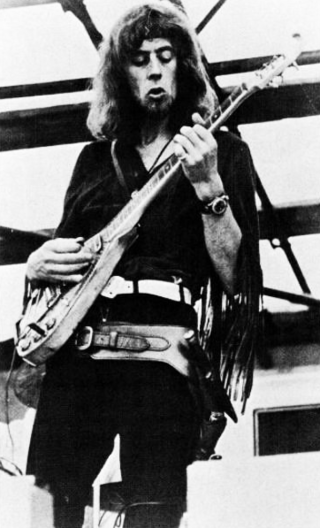
John Mayall & the Bluesbreakers are an English blues rock band led by multi-instrumentalist, singer and songwriter John Mayall. The band has been influential as an incubator for British rock and blues musicians. Many of the best known bands to come out of Britain in the 1960s and 1970s had members that came through the Bluesbreakers at one time, forming the foundation of British blues music that is still played heavily on classic rock radio. Among those with a tenure in the Bluesbreakers are Eric Clapton and Jack Bruce, Peter Green, Mick Fleetwood, and John McVie, Mick Taylor, Aynsley Dunbar, Jon Hiseman, Dick Heckstall-Smith and Tony Reeves, and numerous others.

John Mayall is an English blues and rock musician, songwriter and producer. In the 1960s, he formed John Mayall & the Bluesbreakers, a band that has counted among its members some of the most famous blues and blues rock musicians.

John Symon Asher Bruce was a Scottish musician. He gained popularity as the primary lead vocalist and bassist of rock band Cream. After the group disbanded in 1968, he pursued a solo career and also played with several bands.
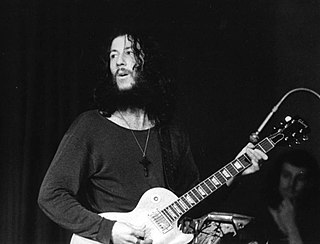
Peter Allen Greenbaum, known professionally as Peter Green, was an English blues rock singer-songwriter and guitarist. As the founder of Fleetwood Mac, he was inducted into the Rock and Roll Hall of Fame in 1998. Green founded Fleetwood Mac in 1967 after a stint in John Mayall's Bluesbreakers and quickly established the new band as a popular live act in addition to a successful recording act, before departing in 1970. Green's songs, such as "Albatross", "Black Magic Woman", "Oh Well", "The Green Manalishi " and "Man of the World", appeared on singles charts, and several have been adapted by a variety of musicians.

Eric Victor Burdon is an English singer and songwriter. He was previously the lead vocalist of the R&B and rock band the Animals and the funk band War. He is regarded as one of the British Invasion's most distinctive singers with his deep, powerful blues-rock voice. Burdon is also known for his intense stage performances.
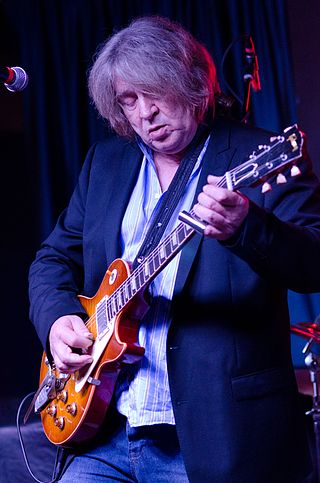
Michael Kevin Taylor is an English guitarist, best known as a former member of John Mayall's Bluesbreakers (1967–1969) and the Rolling Stones (1969–1974). As a member of the Stones, he appeared on Let It Bleed (1969), Get Yer Ya-Ya's Out! The Rolling Stones in Concert (1970), Sticky Fingers (1971), Exile on Main St. (1972), Goats Head Soup (1973) and It's Only Rock 'n Roll (1974).

John Graham McVie is a British bass guitarist. He is best known as a member of the rock bands John Mayall & the Bluesbreakers from 1964 to 1967 and Fleetwood Mac since 1967. His surname, combined with that of drummer Mick Fleetwood, was the source for the band's name.

Aynsley Thomas Dunbar is an English drummer. He has worked with John Mayall, Frank Zappa, Jeff Beck, Journey, Jefferson Starship, Nils Lofgren, Eric Burdon, Shuggie Otis, Ian Hunter, Lou Reed, David Bowie, Mick Ronson, Whitesnake, Pat Travers, Sammy Hagar, Michael Schenker, UFO, Michael Chapman, Jake E. Lee, Leslie West, Kathi McDonald, Keith Emerson, Mike Onesko, Herbie Mann and Flo & Eddie. Dunbar was inducted into the Rock and Roll Hall of Fame as a member of Journey in 2017.
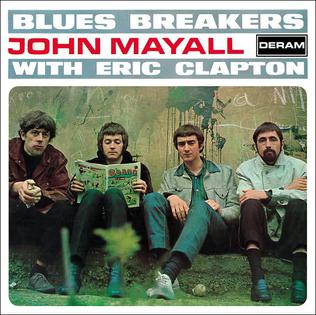
Blues Breakers, colloquially known as The Beano Album, is the debut studio album by the English blues rock band John Mayall & the Bluesbreakers, originally credited to John Mayall with Eric Clapton. Produced by Mike Vernon and released in 1966 by Decca Records (UK) and London Records (US), it pioneered a guitar-dominated blues-rock sound.
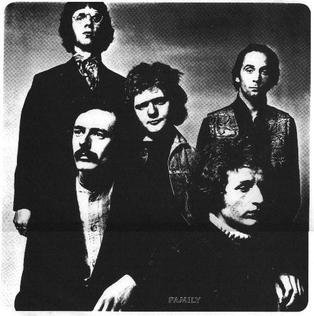
Family were an English rock band, active from late 1966 to October 1973, and again since 2013 for a series of live shows. Their style has been characterised as progressive rock, as their sound often explored other genres, incorporating elements of styles such as folk, psychedelia, acid rock, jazz fusion, and rock and roll. The band achieved recognition in the United Kingdom through their albums, club and concert tours, and appearances at festivals.
Stud is an English/Northern Irish rock band from the early 1970s, that featured two members of Taste - bassist Charlie McCracken and drummer John Wilson - along with former Family and Eric Burdon & the Animals member - guitarist John Weider - and ex Blossom Toes member Jim Cregan.
Hughie Flint is an English retired drummer, known for his stint in John Mayall & the Bluesbreakers during the early 1960s, mainly for his contribution towards their album Blues Breakers with Eric Clapton (1966).
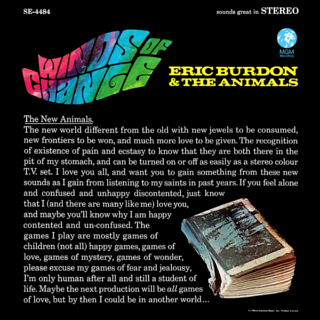
Winds of Change is the debut album by British-American band Eric Burdon & the Animals, released in October 1967 by MGM Records. The album was recorded following the 1966 dissolution of the original group the Animals and singer Eric Burdon's move to San Francisco, where he and drummer Barry Jenkins formed the new Animals lineup with musicians Vic Briggs, Danny McCulloch and John Weider. The album was produced by Tom Wilson and arranged by Briggs in sessions that spanned several months.
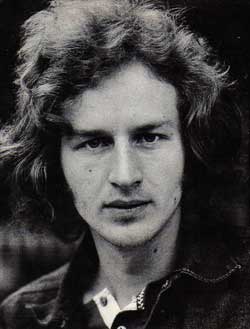
Richard Roman Grechko, better known as Ric Grech, was a British rock musician. He is best known for playing bass guitar and violin with the rock band Family as well as in the supergroups Blind Faith and Traffic. He also played with ex-Cream drummer Ginger Baker.

Bare Wires is a studio album by John Mayall's Bluesbreakers, featuring Mick Taylor on guitar, Chris Mercer and Dick Heckstall-Smith on saxophones, Jon Hiseman on drums, Henry Lowther on cornet and violin, and Tony Reeves on bass. It was released in 1968 on Decca Records. The album was the last John Mayall studio album to feature the name "Bluesbreakers". The album was also Mayall's first successful U.S. album reaching #59 on the Billboard 200.

The discography of English blues rock musician John Mayall, including the band John Mayall & the Bluesbreakers, consists of 35 studio albums, 34 live albums, 24 compilation albums, four extended plays (EPs), 44 singles and four video albums. Mayall's 38th studio album was released in 2022.















